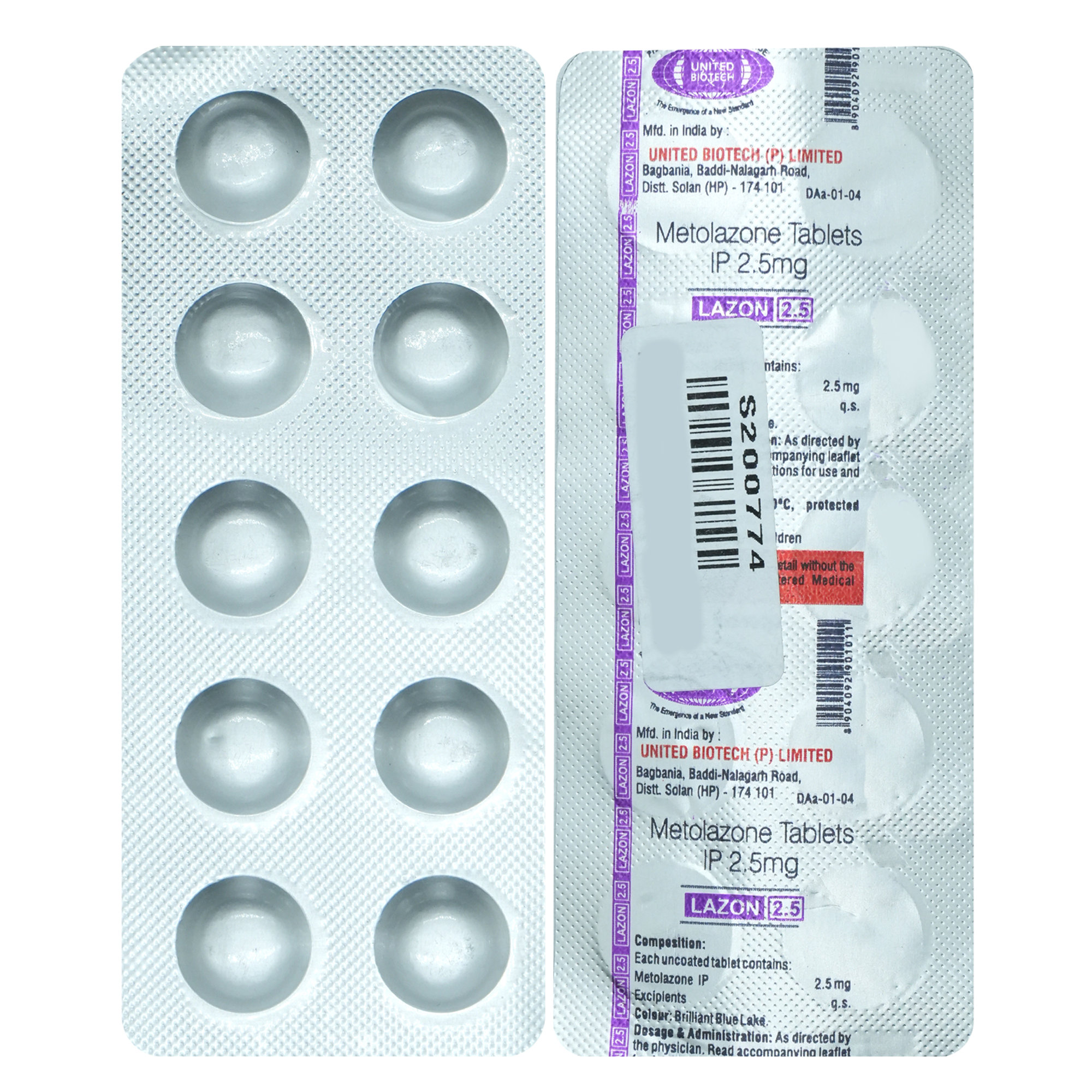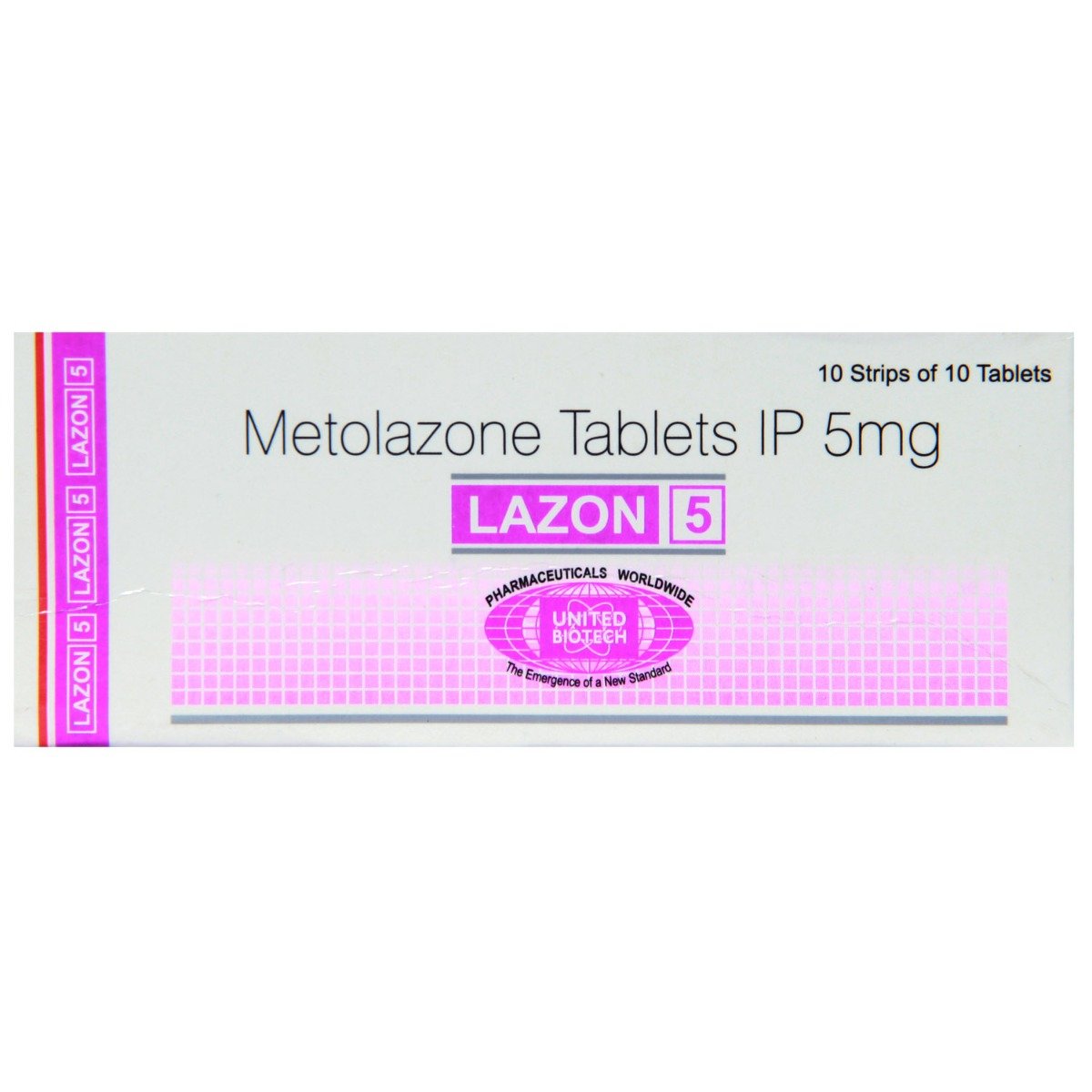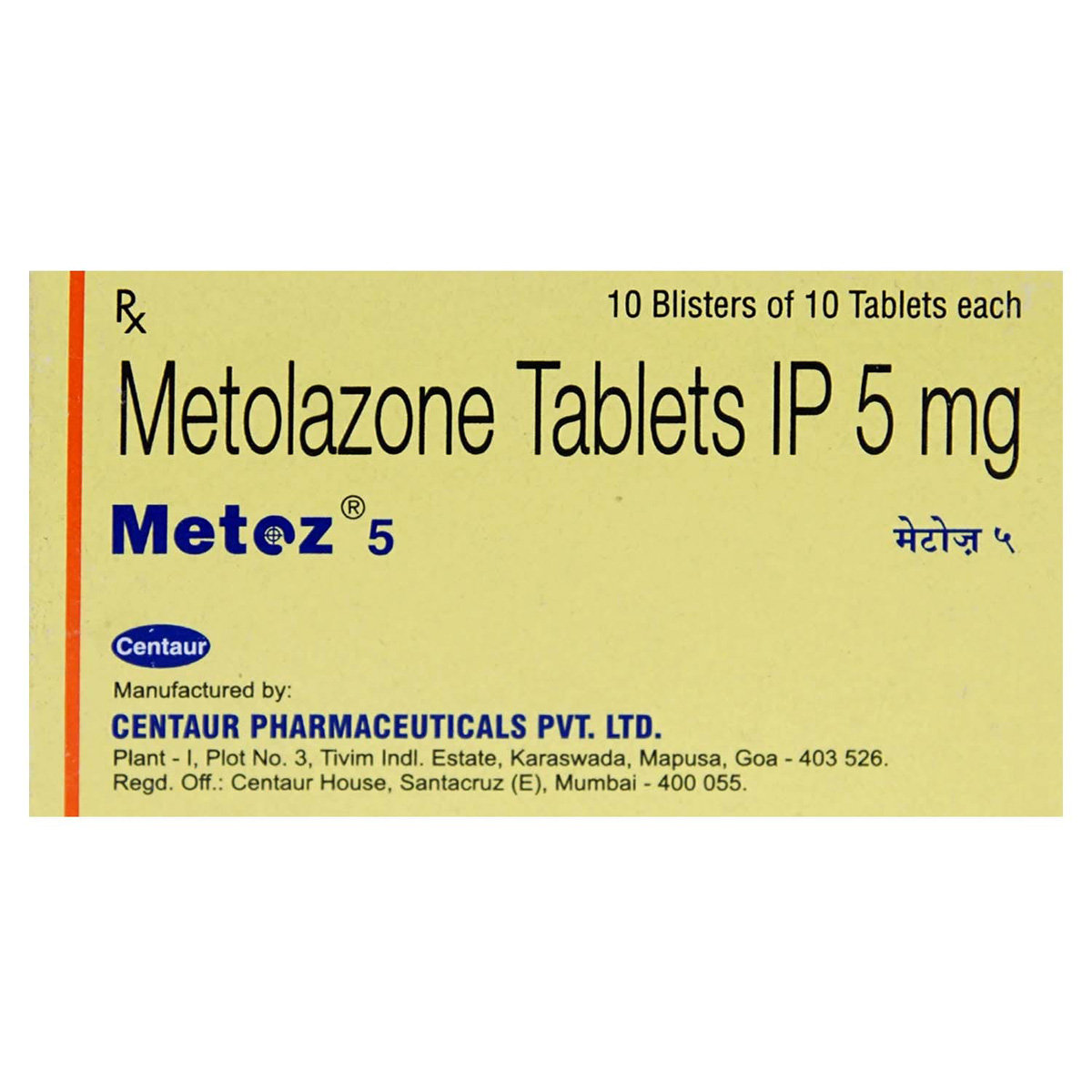Metolazone
About Metolazone
Metolazone belongs to the group of medicines called diuretics, indicated in the treatment of oedema (fluid retention) caused by kidney disease or heart failure. Additionally, it is also used alone or in combination with other medicines to treat high blood pressure.
Metolazone contains Metolazone, which works by causing the kidneys to reduce the amount of water and salt in the body by increasing the amount of urine. Thereby, it helps reduce fluid retention and lowers blood pressure.
In some cases, Metolazone may cause side effects such as nausea, vomiting, diarrhoea, and constipation. Most of these side effects may not require medical attention and will resolve gradually over time. However, you are advised to talk to the doctor if the side effects persist or worsen.
Do not take Metolazone if you are allergic to any of its components or if you are pregnant or breastfeeding. Metolazone is not recommended for children below 18 years. Keep the doctor informed about your health condition and medications to rule out any unpleasant side effects/interactions.
Uses of Metolazone
Medicinal Benefits
- Metolazone contains Metolazone, a diuretic that helps eliminate excess fluid from the body.
- It is used in the treatment of oedema (fluid retention) associated with kidney disease or heart failure.
- It helps reduce swelling by increasing the excretion of water and salt through urine.
- Metolazone is also used in the management of high blood pressure (hypertension), either alone or in combination with other antihypertensive medicines.
- It helps lower blood pressure, thereby reducing the workload on the heart.
- It aids in preventing complications related to uncontrolled blood pressure, such as stroke, heart attack, and kidney damage.
Directions for Use
- Take Metolazone with or without food as advised by your doctor.
- It is advised to take Metolazone once daily; however, follow your doctor’s recommendation regarding the dosage and duration.
- Swallow Metolazone as a whole with a glass of water.
- Do not crush, break, or chew it.
Storage
Side Effects of Metolazone
- Nausea
- Vomiting
- Diarrhoea
- Constipation
- Headache
- Dizziness
- Muscle pain
- Fatigue
Drug Warnings
- Do not take Metolazone if you are allergic to any of its components, if you have anuria (unable to urinate), hepatic precoma or coma.
- Metolazone is not recommended during pregnancy and breastfeeding.
- Inform the doctor if you have liver or kidney problems, fluid or electrolyte imbalance, Addison’s disease (a syndrome due to low levels of corticosteroid hormone secretion), diabetes or gout (high levels of uric acid in the blood).
- Keep your doctor informed if you have systemic lupus erythematosus (an inflammatory disease of connective tissue), porphyria, eye pain or vision problems, or high cholesterol.
- Let the doctor know if you are taking any other medicines, including supplements or herbal products.
Drug Interactions
Drug-Drug Interactions: Inform the doctor if you are taking a muscle relaxant (tubocurarine), immunosuppressant (cyclosporine), cardiac glycoside (digoxin), antiarrhythmic (sotalol), painkillers, anticoagulants, antimanic agents (lithium) or anti-infectives (methenamine).
Drug-Food Interactions: No interactions found/established.
Drug-Disease Interactions: Inform the doctor if you have anuria (unable to urinate), hepatic coma or precoma, electrolyte losses, or severe liver/kidney disease.
Drug-Drug Interactions Checker List:
Safety Advice

Alcohol
cautionConsuming alcohol with Metolazone may cause a decrease in blood pressure, leading to dizziness and fatigue. Therefore, avoid alcohol consumption during treatment with Metolazone.

Pregnancy
unsafeMetolazone is not recommended during pregnancy. Consult the doctor if you are pregnant, think you may be pregnant or are planning a pregnancy.

Breast Feeding
unsafeMetolazone is not recommended during breastfeeding. Consult the doctor if you are breastfeeding.

Driving
cautionMetolazone may cause dizziness and fatigue. Avoid driving or operating heavy machinery if you experience these symptoms.

Liver
consult your doctorPlease consult the doctor if you have liver problems or any concerns regarding this.

Kidney
cautionMetolazone should be used with caution in patients with severe renal impairment. Please consult the doctor if you have kidney problems or any concerns regarding this.

Children
unsafeMetolazone is not recommended for children below 18 years as safety and effectiveness have not been established.
Habit Forming
Diet & Lifestyle Advise
- Follow a low-salt and low-fat diet.
- Exercise regularly for at least 30 minutes on most days.
- Eat a diet rich in whole grains, vegetables, and fruits.
- Avoid smoking and alcohol consumption.
- Maintain a healthy weight with a proper diet and exercise.
- Manage stress with meditation, yoga, and massage.
Special Advise
If you are due to undergo any surgery or laboratory tests, inform the doctor that you are taking Metolazone.
Patients Concern
Disease/Condition Glossary
Oedema: Oedema is a build-up of fluid in the body, which causes the affected tissue to become swollen. It can occur due to immobility, certain medical conditions and medications.
High blood pressure (hypertension): It is a condition in which the blood exerts increased pressure on the walls of blood vessels, leading to hypertension. This condition can lead to hardened arteries (blood vessels), decreasing the blood and oxygen flow to the heart. Raised blood pressure can cause chest pain (angina) and a heart attack. Additionally, high blood pressure also causes brain damage (stroke) and kidney failure. Symptoms of high blood pressure include headache, dizziness, nose bleed, changes in vision, chest pain, weakness and dyspnoea (shortness of breath). However, most of the time, the signs and symptoms of hypertension are none.
FAQs
Metolazone is used to treat fluid retention (oedema) and high blood pressure (hypertension).
Metolazone helps the kidneys remove water from the body and lower blood pressure.
Please do not stop taking Metolazone without consulting your doctor. To treat your condition effectually, continue taking Metolazone for as long as your doctor has prescribed it to you. Do not be reluctant to speak with your doctor if you experience any difficulty while taking Metolazone.
Metolazone may make your skin sensitive to sunlight. Therefore, avoid prolonged or unnecessary sun exposure. Wear protective clothing and use sunscreen whilst going out.
Metolazone may cause light-headedness, dizziness, and fainting when you get up too quickly from a lying position. To prevent this, get out of bed slowly, resting your feet on the floor for a few minutes before standing up.
No, Metolazone is not a steroid. It is a diuretic medication used to treat oedema (fluid retention) caused by kidney disease, heart failure or other medical conditions.
While using Metolazone, you should know that this medication may make you dizzy or drowsy. Be cautious and avoid activities that require focus and attention, such as driving or operating machinery.
Metolazone typically starts working within 1-1.5 hours, although the exact timing can vary from person to person. Factors such as the severity of the condition, dosage, and individual metabolism can influence how quickly it takes effect. Once it starts working, the effects of Metolazone can last for up to 12-24 hours.
It is essential to exercise caution when considering taking any medications together including fexofenadine. Unless your doctor recommends, taking Metolazone and Fexofenadine together is generally not advisable. Potential interactions or side effects may occur, and your doctor can assess whether the combination is safe and necessary for your specific situation. Always consult your doctor or healthcare professional before combining medications, and never take medications without their recommendation.
Take Metolazone exactly as prescribed by your doctor to manage your high blood pressure (hypertension). This is a long-term treatment, which means you'll need to take it continuously for an extended period. Regular check-ups with your doctor are crucial to monitor your blood pressure, adjust your dosage as needed, and ensure Metolazone works effectively and safely for you. Following your doctor's instructions and attending regular check-ups can effectively manage your high blood pressure and reduce the risk of related health issues.
Continue taking Metolazone as directed by your doctor. The duration of treatment varies depending on your condition and response to Metolazone. Follow your doctor's instructions and schedule regular check-ups to monitor your progress and adjust treatment as needed.
Metolazone may cause side effects such as nausea, vomiting, diarrhoea, and constipation. Most of these side effects may not require medical attention and resolve gradually over time. However, you are advised to talk to the doctor if the side effects persist or worsen.






